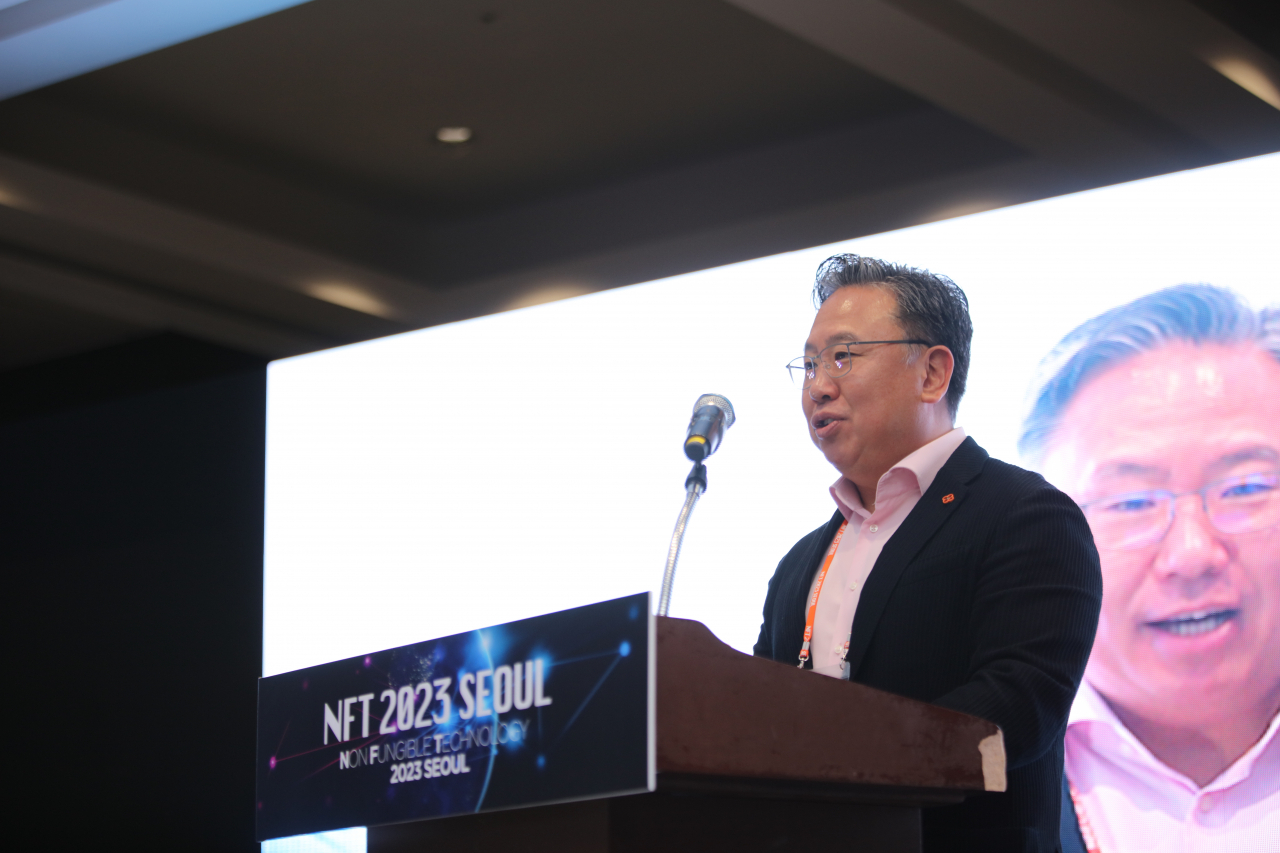Experts explore NFT applications, STO market dynamics
By Moon Joon-hyunPublished : Sept. 4, 2023 - 09:52

The NFT 2023 Seoul Conference on Friday focused the connection between non-fungible tokens (NFTs) and Web3 infrastructure as well as the role of Security Token Offerings in fundraising.
Patrick Yoon from cryptocurrency exchange company Crypto.com Korea opened the sessions by talking about the the growth trajectory Web3. He predicted a $50 trillion-$60 trillion Web3 valuation by 2030, with NFTs poised to claim 10 to 15 percent of the digital asset valuation by that time.
"NFT creators have many ways to monetize their creativity," he said.
To simplify the concepts, Shin Young-sun from Hello Web3 used an analogy, likening NFTs to a “dish” and Web3 to “cutlery,” suggesting that their value lies in tangible experiences, like proving that you went to a New Jeans fan event.
The practical implementations of Web3 were further explored by Kim Min-suk from T-Max Metaverse, who brought focus to the transition from 2D to dynamic 3D content. He revealed his vision for a platform where "ideas become artwork," underpinned by AI and blockchain.
Another real-world application was a 3D web company called iStaging Asia's innovative product, “iStaging -- Our Song.” Showcased by CEO Choo Seon-woo, it lets users engage with music and art in a spatial environment and purchase unreleased music NFTs. Further, Choo pointed out their platform's unique capability to "virtually simulate and experience any environment," which has attracted luxury brands such as LVMH and Dior for collaborations.
The dialogue progressed to broader applications within entertainment, “We're not just creating NFTs; we're crafting the future of digital engagement,” said Kang Seung-bo from Cube Entertainment Metaverse.
He highlighted the joint venture with Animoca Brands, which has led to the Anibear project, in conjunction with Cube Entertainment's artists, saw over 2,000 NFT sales during a single event.
The conference, organized by The Korea Herald in collaboration with ArtToken and Soongsil University, also delved into Security Token Offerings (STOs), a form of fundraising in the cryptocurrency and blockchain. This segment aimed to explore the integration of blockchain technology with traditional financial systems.
Kang Tae-hong from the Graduate School of Information Science, Soongsil University, set the stage by charting the anticipated growth of the global tokenization market. It is projected to grow from its current valuation of $25.9 billion to an $126.8 billion by 2030.
"While STOs mark a seismic shift in asset tokenization, achieving a sustainable market growth demands striking the right balance between their benefits and inherent challenges," he noted.
Lee Yong-jae from Mirae Asset Securities expanded upon the significance of STOs, underscoring the combination of traditional securities with the blockchain. A insight was that 91 percent of institutional investors are turning their gaze towards these tokenized assets, potentially constituting 10 percent of global GDP by 2030. "In the evolving financial landscape, STOs don't merely serve financing but also knit core business strategies," he said.
Regulatory nuances were also covered by Lee Dong-kuk from the DongIn Law Group. He explained the intersection of traditional capital market regulations with STOs. While these digital assets offer the perks of decentralized trading and finer investment granularity, the current legal framework lags.
"As decentralized finance grows, our regulatory tapestry must weave innovation and protection in unison," he said.
The applicative dimension of STOs was covered by professor Jang Hee-soo of Soongsil University, drawing upon the varied landscapes of the US, Japan, and South Korea. Referring to the confluence of "virtual assets," "cryptocurrencies," and "tokens," Jang said, "An electronic entity with real economic value is what truly defines a 'Virtual Asset'."
Kim Myeong-sik from real estate company Jones Lang LaSalle Incorporated offered a niche exploration into the realm of real estate. He emphasized the capability of STOs and NFTs to democratize property ownership and amplify transactional transparency. "Blockchain's immutable records ensure trust, curbing fraud and inefficiencies in real estate transactions," he said.



















![[Today’s K-pop] Treasure to publish magazine for debut anniversary](http://res.heraldm.com/phpwas/restmb_idxmake.php?idx=642&simg=/content/image/2024/07/26/20240726050551_0.jpg&u=)